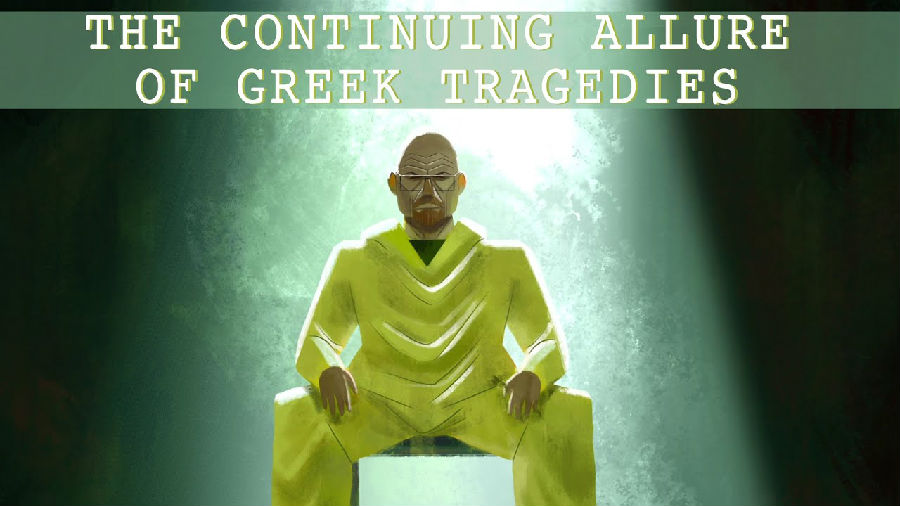(单词翻译:单击)
The story goes something like this: a royal, rich or righteous individual, who otherwise happens to be a lot like us,
故事一般都是这样开始的:一个和我们相似,却有着皇家血统的,或是富有的,又或是有正义感的人,
makes a mistake that sends his life, and the lives of those around him, spiraling into ruin.
犯了一个错误,使他自己和他周围人的生活都被卷入不幸的毁灭。
Sound familiar? This is the classic story pattern for Greek tragedy.
听起来熟悉吧?这是古希腊悲剧的经典故事架构。
For thousands of years, we've spun spellbinding tales that fit this pattern,
在后来的几千年中,我们根据这种故事结构编造了更多引人入胜的故事,
and modern storytellers around the world continue to do so.
现如今,世界各地的故事作者们也是如此来创作。
Three critical story components influenced by Aristotle's "Poetics" help us understand the allure.
根据亚里士多德的《修辞学》,一个故事有三个决定性的组成部分,可以帮助我们理解这些诱惑力。
First, the tragic hero should be elevated in rank and ability, but also relatable.
首先,一个悲剧里的英雄人物应该是有着很高的地位和能力,但是也要让观众有认同感。
Perhaps he is a king, or extraordinary in some other way.
或许他是一个国王,又或者是一个在其他方面极其杰出的人物。
But because you and I are neither unusually good nor unusually bad, neither is the hero.
但是因为你和我都并非极度善良,亦不是超出一般的邪恶,所以这个英雄人物也不是。
And he has one particular tragic flaw, or hamartia,
他有着一个特别的、具有悲剧性的弱点,或缺陷,
something like ambition, tyranny, stubbornness, or excess pride that causes him to make a critical mistake.
比如说有野心,专制,倔强,或者是自负,这种缺陷使他犯下非常严重的错误。
And from that mistake comes disaster and downfall.
紧接着灾难和衰败就会随着这个错误而来。
As an example of these elements in action, let's look to Sophocles's "Oedipus Rex,"
举一个结合这些元素的例子,我们一起看看苏菲克里斯的作品《俄狄浦斯王》,
about a man who doesn't know he was adopted,
这个故事是关于一个不知道自己是被领养的人,
and is warned by an oracle that he's destined to murder his father and marry his mother.
被一个预言警告,说他未来注定会谋杀他的父亲,并且与他的生母结婚。
In trying to escape this fate, he kills a man who won't get out of his way at a crossroad.
这个人在试图逃脱他的命运的过程中,杀了一个在交叉路口不给他让路的人。
He then cleverly answers the riddle of the monstrous Sphynx, freeing the Kingdom of Thebes from a plague.
然后他很聪明的回答了凶暴的斯芬克斯的谜语,拯救了在灾难中的底比斯王国。
He marries the widowed queen and becomes king.
他与守寡的王后结婚,并成了国王。
But after he finds out that the murdered man was his father, and the queen he married is his mother,
但是后来他发现他谋杀的那个男人就是他的父亲,而与他结婚的王后正是他的母亲。
Oedipus gouges out his eyes and retreats into the wilderness.
俄狄浦斯将自己的双眼挖出后隐居深林。

At the beginning of his story, Oedipus is elevated in ability, and he's elevated in rank.
在他的故事开始时,俄狄浦斯是一个很有能力和地位的人。
He's neither unusually evil nor saintly. He's relatable.
他并非恶魔,也不成圣贤。他是可以让观众有认同感的。
Notice the height of the fall. Once a king, but now homeless and blind.
注意他处境前后的落差。曾经的国王,现在却是无家可归又失明。
It's more tragic, after all, if a king falls from a tall throne than if a jester falls off his step stool.
相比之下,一个国王从皇位上跌落谷底,比一个小丑从他的高脚凳上摔下来要悲剧的多了。
Oedipus's tragic flaw is hubris, or excessive pride,
俄狄浦斯的悲剧性的弱点是傲慢,或者说是自负,
and it causes him to attempt to avoid the fate prophesied for him, which is exactly what makes it happen.
这令他试图避免命运为他设计的轨道,恰恰是他的尝试使他的命运无可避免。
He's a particularly unlucky soul because his mistake of killing his father and marrying his mother is done in complete ignorance.
他是一个尤为不幸的灵魂,因为他所犯的错误,比如杀了他的父亲和与他的母亲结婚,都是在他完全不知真相的情况下做的。
Of course, these narrative principles transcend classic Greek tragedy.
当然,这些叙述的原则远不止于古典希腊悲剧。
In Shakespeare's canon, we see Hamlet's indecisiveness lead to a series of bad decisions, or perhaps non-decisions,
在莎士比亚的作品中,哈姆雷特的犹豫不决导致了他一系列糟糕的决定,或者是没有作为,
that culminate in the death of almost every character in the play,
最后使得几乎每一个剧中的人物都以死亡收场,
and Macbeth's ambition catapults him to the top before sending him careening to his grave.
而麦克白的野心使他走到人生的高点,但又紧接着把他推向他自己的坟墓。
Even modern pop culture staples like "Game of Thrones" and "The Dark Knight"
即便是现代流行文化的主要产品,像是美剧《权力的游戏》和电影《黑暗骑士》,
resonate with the tropes Aristotle identified over 2000 years ago.
也和亚里士多德两千年前所确定的比喻修辞手法相互呼应。
So what's the point of all of this suffering?
那么,这些苦难的经历到底有什么意义呢?
According to Aristotle, and many scholars since, a good tragedy can evoke fear and pity in the audience:
根据亚里士多德和很多其他学者的说法,一部好的悲剧可以唤起观众内心的恐惧和怜悯之情:
Fear of falling victim to the same or similar catastrophe, and pity for the height of the hero's downfall.
对沦落为与主角那样经历相同或相似苦难的受害者感到恐惧,对一位英雄从高处衰败的落差感到怜悯。
Ideally, after watching these tragic events unfold, we experience catharsis, a feeling of relief and emotional purification.
理想地,在这些悲剧情节呈现在我们面前时,我们能够体验“精神发泄”,一种安慰和情感上的净化结合起来的感觉。
Not everyone agrees why this happens.
不是每个人都对这种情况发生的原因保持一致的看法。
It may be that empathizing with the hero allows us to experience and release strong emotions that we keep bottled up,
这可能是由于对英雄人物的同情,使我们允许自己释放和感受自己储蓄已久的强烈情感,
or maybe it just lets us forget about our own problems for a little while.
又或许是观看悲剧使我们能短暂地忘记自己的苦恼。
But regardless of how you feel when you watch poor Oedipus, never has there been a more salient reminder
但是无论你在看可怜的俄狄浦斯时感受到了什么,从来没有过比这还显著的提醒:
that no matter how bad things get, at least you didn't kill your father and marry your mother.
不论事情已经糟糕到了什么地步,至少你没有杀了自己的父亲,又和自己的母亲结了婚。


